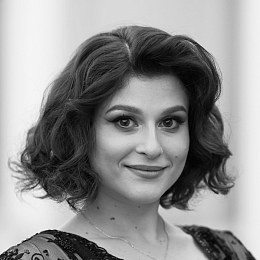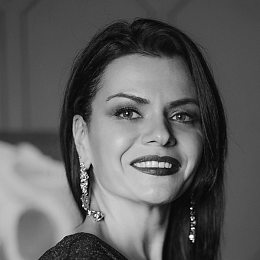stage
Artists

Credits
Music by Giuseppe Verdi
Libretto by Francesco Maria Piave
based on Victor Hugo's play Le Roi s'amuse
Author of artistic concept and Production Director: Vyacheslav Starodubtsev
Music Director and Conductor: Mikhail Tatarnikov
Costume Designer: Sergey Pugachev
Set Designer: Timur Gulyaev
Lighting Designer: Irina Vtornikova
Video Designer: Vadim Dulenko
Stage Movement: Sergey Zakharin
Chief Choirmaster: Vyacheslav Podyelsky
Choirmaster: Sergey Tenitilov
Assistants to Conductor: Alexey Babushkin, Maria Moiseenko
Assistants to Production Director: Igor Bondarenko, Nikolay Natsybulin
Assistant to Stage Movement: Dmitry Romanov
3 hours
two intermissions
One of the most famous creations by Giuseppe Verdi, one of the top ten operas in the world (with the song “La donna è mobile” / “Woman is fickle”, which is constantly gaining popularity), is back on the stage of the Novosibirsk Opera.
It seems that without Giuseppe Verdi's Rigoletto, the playbill of any opera house is unthinkable: this is the absolute and greatest hit of all time! But Rigoletto can only be performed at the theatre where there is Rigoletto – the very baritone who was born for perhaps the most difficult and great role…
Until the end of his life, Verdi considered Rigoletto his best opera. It was written by the 37-year-old composer in 1851. Secluded in the Italian town of Busseto, he worked on Rigoletto with such intensity that he wrote the opera in 40 days! The premiere took place on March 11, 1851 at the Venetian La Fenice Theatre, on which order the opera was composed. The performance was a huge success, and the Duke's song, as the composer had expected, made a real splash: leaving the theatre, the audience hummed or whistled its playful motif. After the premiere, Verdi said: “I am pleased with myself and I think I will never write anything better.”
The plot of Rigoletto, based on Victor Hugo's tragi-comic play Le roi s'amuse, revolves around the dissolute Duke of Mantua and his jester Rigoletto. The action takes place during a brilliant ball: the duke is courting Countess Ceprano, arousing the jealousy of her husband. The jester Rigoletto maliciously mocks the count and advises the duke to kidnap the lovely countess that very night. Enraged, Ceprano vows revenge. Count Monterone appears and curses the duke who seduced his daughter. The curse also falls on the jester, who stood up for the master and publicly ridiculed the old man...
According to the idea of the author of the new production of Rigoletto, the chief stage director of NOVAT Vyacheslav Starodubtsev, the sublime opera classics should be cleared of staging stamps that have been stratified for more than a century and a half, and filled with modern solutions and technologies.
The action takes place in Mantua and its environs in the 16th century.
Act I
Scene 1
A ball is underway at the palace of the Duke of Mantua. A dissolute ruler boasts to a courtier Borsa of his love adventures: soon he will seduce the beautiful stranger whom he meets in church. At the ball, the Duke also begins flattering Countess Ceprano. His jester Rigoletto ridicules the Countess's husband. The courtiers plan to take revenge on pagliacci for his sharp tongue; one of them, Marullo, says that Rigoletto has got a lover. Suddenly, Count Monterone appears, he has come to defend the tainted honour of his daughter. But he is not spared the jester's ridicule either. Monterone curses both the Duke and his servant.
Scene 2
On the way home, in a dark street, Rigoletto meets Sparafucile, a hired assassin, who offers him his services. Thoughts of a curse haunt the jester. He thinks about his own contemptible position, which makes his hatred of the courtiers boil even more.
At home, Rigoletto meets his daughter, the only joy he has left after his wife's death. They are talking tenderly. Guarded from the world by the care and fear of her father, young Gilda lives in seclusion under the watchful eye of the maid Giovanna, with whom the girl appears only in church. As he departs, Rigoletto instructs Giovanna to guard the girl carefully. The Duke is watching them from his hide-out. He bribes the maid to keep quiet. Calling himself a poor student Gualtier Maldè, the Duke confesses his love to Gilda. The meeting is interrupted by a noise from the street, the Duke must flee. Left alone, the girl repeats the name of the mysterious admirer.
Courtiers in disguise have gathered at Rigoletto's house to kidnap Gilda. Faced with the jester, the conspirators convince him that they want to abduct Count Ceprano's wife. Rigoletto buys into this ruse and helps them kidnap his own daughter. Gilda's screams can be heard from afar, only then does he realize what has happened.
INTERMISSION
Act II
Scene 3
The hall in the palace. The Duke is worried: when he returned to Gilda's house, he did not find her there. The courtiers tell him about the night adventure, about the kidnapping of Rigoletto's lover. So the Duke finds out that the girl is in the palace, and hurries to her. Rigoletto hides his despair under the familiar mask of a jester. He knows that his daughter is in the palace, and after a fit of anger, he begs the courtiers to return his only treasure. Gilda, in tears, goes out to her father and tells him everything. Monterone is led past to the dungeon, lamenting that his curses have no power. The hunchback swears revenge. Gilda begs for mercy, she confesses that she loves the Duke.
INTERMISSION
Scene 4
A tavern on the riverbank. Night. Rigoletto brings his daughter, who is still in love with the Duke, to see how he is having fun with another woman. The Duke is courting Sparafucile's sister Maddalena. Gilda is left in despair. Rigoletto comforts her, promising to take revenge soon. He sends his daughter to Verona, where they will meet later. Once Gilda has left, the jester gives Sparafucile an advance to kill the Duke, the rest will be paid when he receives the corpse.
The storm begins. The Duke falls asleep. Maddalena asks her brother to have mercy on him. Gilda, who is already prepared for the road in men's clothes, returns and hears their conversation. Sparafucile agrees to kill the first one who appears before midnight instead of the Duke. Gilda realizes that the time has come to act – the voice of love is stronger than reason. She knocks on the door and falls under the blows of Sparafucile. The storm subsides. At midnight, Rigoletto takes the sack with the body and is about to throw it into the water. But now the Duke's song is heard in the night. The hunchback cuts open the sack and sees Gilda. Dying, the daughter begs for forgiveness. Rigoletto falls over her body with a cry: “La maledizione!” (“The curse!”)
















